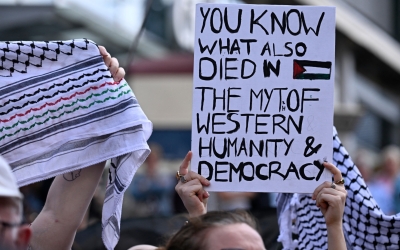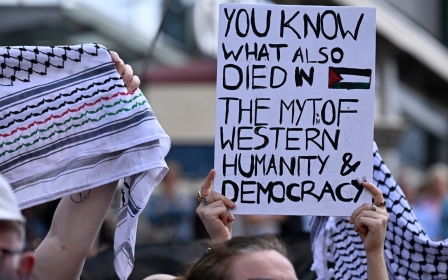Why Israeli leaders admit if they were Palestinian they would fight for freedom

In a recent interview in the Israeli newspaper Maariv, Ami Ayalon, the former head of the Israeli intelligence organisation Shabak, stated that if he were Palestinian, he would have fought those who stole his land "without limits".
"As far as the Palestinians are concerned, they lost their land, which is why when people ask me, what would you do if you were Palestinian? I say that if someone came and stole my land, the land of Israel, I would fight him without limits", he added.
The Palestinians, Ayalon affirmed, "see themselves as a people. One of our tragedies is that we see them as individuals, some of whom are good, while others are bad."
In the flurry of Israeli and pro-Israel denunciations of Palestinians as barbarians, antisemites, pogromists, terrorists, savages, and human animals, among other such racist epithets that a slew of Israeli leaders have called them for the benefit of propaganda, many of Israel's most prominent leaders, like Ayalon, have always identified with the Palestinian struggle and would admit publicly that if they were Palestinian and not Jewish colonists, they would have readily joined the struggle against Zionists and Israel.
Even the famed Israeli defence minister Moshe Dayan understood the struggle of Palestinians in Gaza and their resistance to Israeli colonialism. In April 1956, Palestinian resistance fighters killed a security officer in Nahal Oz, a colony that was established one mile from the Gaza border in 1953.
New MEE newsletter: Jerusalem Dispatch
Sign up to get the latest insights and analysis on Israel-Palestine, alongside Turkey Unpacked and other MEE newsletters
The officer had beaten up several Palestinians a few days earlier when he caught them attempting to return to their lands after Israelis expelled them. He forced them to return to Gaza. At his funeral, Dayan reminded the mourners:
Let us not today cast blame on the murderers. Who are we that we would argue against their hatred? For eight years now they sit in their refugee camps in Gaza, and before their very eyes, we turn into our homestead the land and the villages in which they and their forefathers had lived… We are a generation of settlers, and without the steel helmet and the cannon we cannot plant a tree and build a home.
Ayalon's recent words are not new. In a March interview with the American television network ABC, he declared that if he were Palestinian, he "would fight against Israel" and "would do everything" to achieve liberty.
Ayalon is not the first Israeli leader to understand perfectly well the struggle of the Palestinians to end Zionist settler-colonialism and Israeli apartheid. Indeed, he is part of a long list of Zionist and Israeli leaders who, without hesitation, averred their understanding or even their identification with the Palestinian struggle.
Follow Middle East Eye's live coverage for all the latest on the Israel-Palestine war
In 1923, Vladimir Jabotinsky, the founder of Revisionist Zionism, who was later succeeded by Menachem Begin, commented on Palestinian resistance:
Any native people - it's all the same whether they are civilised or savage - views their country as their national home, of which they will always be the complete masters. They will not voluntarily allow, not only a new master, but even a new partner. And so it is for the Arabs. Compromisers in our midst attempt to convince us that the Arabs are some kind of fools who can be tricked… [and] who will abandon their birthright to Palestine for cultural and economic gains. I flatly reject this assessment of the Palestinian Arabs. Culturally they are 500 years behind us, spiritually they do not have our endurance or our strength of will, but this exhausts all of the internal differences… They look upon Palestine with the same instinctive love and true fervour that any Aztec looked upon his Mexico or any Sioux looked upon the prairie… this childish fantasy of our "Arabo-philes" comes from some kind of contempt for the Arab people… [that] this race [is] a rabble ready to be bribed or sell out their homeland for a railroad network.
David Ben-Gurion, Israel's first prime minister, understood the Palestinian struggle fully, even though he was committed to crushing it
Jabotinsky, however, did not identify with the Palestinians (although he attempted to equate them with European Jews, mutatis mutandis, on the level of attachment to their homeland and the use of violence to defend their country).
He understood well that the Palestinians "are not a rabble but a nation". As a fascist who admired Mussolini, Jabotinsky did not allow his racism against the Palestinians to blind him to the conditions on the ground, which is precisely why he sought to fight the Palestinians and subject them to Zionist rule and expulsion.
Other Zionists would identify even more with Palestinians.
David Ben-Gurion, Israel's first prime minister, understood the Palestinian struggle fully, even though he was committed to crushing it. He stated:
If I was an Arab leader, I would never make terms with Israel. That is natural; we have taken their country. Sure, God promised it to us, but what does that matter to them? Our God is not theirs. We come from Israel, it's true, but that was two thousand years ago, and what is that to them? There has been antisemitism, the Nazis, Hitler, Auschwitz, but was that their fault? They only see one thing: we have come and stolen their country. Why should they accept that?
Not an aberration
Zionist leaders' identification with Palestinians continued in the following decades and was perhaps most forcefully expressed by former Israeli Prime Minister Ehud Barak. Barak was a member of an Israeli death squad commando unit dispatched to Beirut in 1973 to kill three Palestinian revolutionaries.
Barak's identification with Palestinians is unreserved, and in an interview with Israeli newspaper Haaretz, he asserted: "If I were a Palestinian, I'd also join a terror group."
Leah Rabin, the widow of the late Yitzhak Rabin, who herself had fought in the 1948 Zionist conquest of Palestine, was more astute in deploying her identification with the Palestinians than all other Zionist leaders.
She asserted in 1997 that, "We [the Jews] used terrorism to establish our state. Why should we expect the Palestinians to be any different?" Palestinians, it would seem, are the same as Jews and not different from them at all.
It is most important to note that in these declarations, none of these Israeli leaders thought that the reason the Palestinians resisted Israel was because Israel was Jewish.
On the contrary, they all affirmed that the reason Palestinians resist Israel and Israeli Jews is because Israelis stole and continue to steal their land and country, oppress them and deprive them of their independence and liberty.
The current Israeli government's appalling propaganda that the 7 October Palestinian operation targeted Israeli Jews as Jews and not as colonisers and was, therefore, the "deadliest" attack on Jews since the Holocaust, as western leaders and their obedient mainstream media have not tired of telling us, aims decidedly to cover up Israeli Jewish colonisation of the land of the Palestinians as the reason why Palestinians resist them.
These lies aim to exonerate Israeli Jews from the crime of stealing the land of the Palestinians and stand in contrast to the insistence of the Palestinians and all these Zionist and Israeli leaders who have always understood the Palestinian struggle, namely, that the Palestinian resistance targets Israeli Jews because they are colonisers and not because they are Jews.
Israeli leaders have always understood that the Palestinian resistance targets Israeli Jews because they are colonisers and not because they are Jews
The understanding and identification with the Palestinian struggle by the very same Israeli leaders who oppressed the Palestinians are not merely rhetorical flourishes or lapses. They speak plainly of a clear understanding of the nature of the violence and oppression that Israel has visited and continues to visit on the Palestinian people.
Contrary to official Israeli propaganda and its repetition by western political leaders and mainstream media, Palestinians who have been resisting Zionist colonisation since the early 1880s are not an aberration at all. Indeed, Palestinians, according to the Israeli leaders cited above, are most similar and not that different from the colonising Zionist Jews who oppress them.
The only difference, it seems, is that Palestinians are not Jews and, therefore, cannot be extended the western respect and admiration that any people who have resisted colonialism for a century and a half deserve.
Whereas Israeli leaders may still identify with Palestinians despite their colonial racism, the deep western racism against the Palestinians is why no western political leaders have ever contemplated what they would do if they were Palestinian.
The views expressed in this article belong to the author and do not necessarily reflect the editorial policy of Middle East Eye.
Middle East Eye delivers independent and unrivalled coverage and analysis of the Middle East, North Africa and beyond. To learn more about republishing this content and the associated fees, please fill out this form. More about MEE can be found here.






